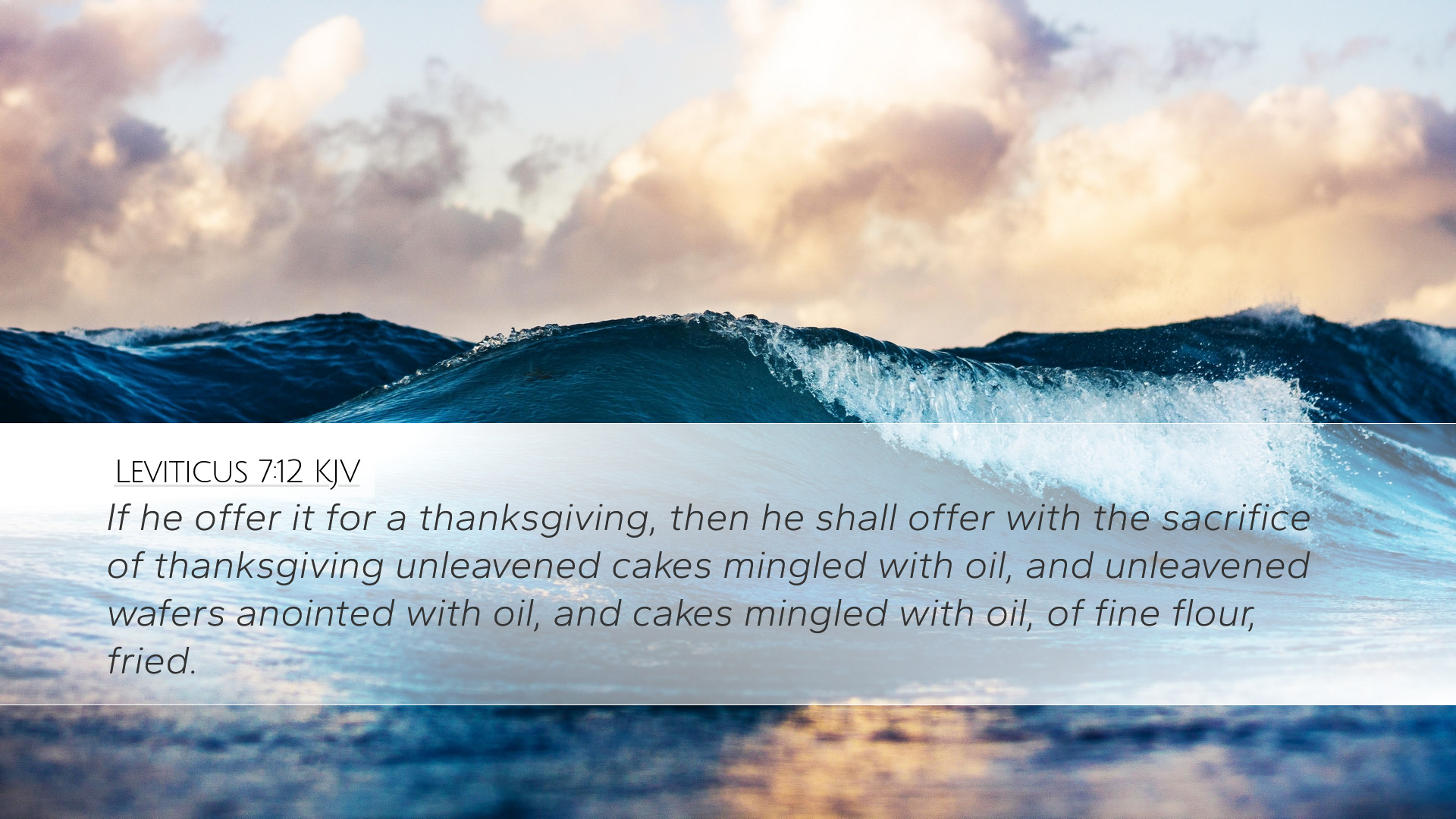Commentary on Leviticus 7:12
Leviticus 7:12 (KJV): “If he offer it for a thanksgiving, then he shall offer with the sacrifice of thanksgiving unleavened cakes mingled with oil, and unleavened wafers anointed with oil, and cakes mingled with oil, of fine flour.”
This verse is not merely a regulation of sacrificial practices but signifies deeper theological insights relevant for contemporary worship and understanding of God's holiness. It provides a rich tapestry of meaning which can be distilled from various public domain commentaries.
Understanding the Context
The book of Leviticus serves as the manual for the priests and people in ancient Israel regarding holiness and worship. Leviticus 7 pertains to the offerings and the conduct associated with them, particularly the peace offerings. Matthew Henry notes that these offerings were meant to express thanks for divine mercies. The thanksgiving offering is especially significant as it captures the essence of gratitude towards God.
The Nature of the Thanksgiving Offering
According to Albert Barnes, the thanksgiving offering is distinct from the sin and guilt offerings, as it is an expression of gratitude rather than a means of atonement. It represents an acknowledgment of God's goodness and mercy bestowed upon the individual. It is important to recognize that the thanksgiving sacrifice, as outlined in this verse, requires specific types of offerings—unleavened cakes mingled with oil, reflecting purity and fullness, and the absence of leaven signifies the removal of sin.
Symbolism of Unleavened Cakes
Adam Clarke emphasizes the significance of unleavened bread within the context of the Israelite faith. Leaven, which represents corruption and sin in the Scriptures, being excluded from these offerings signifies that the act of worship is to be free from moral impurity. The presence of oil, which symbolizes the Holy Spirit, reflects the necessity for divine acceptance in our offerings.
The Components of the Offering
- Unleavened Cakes: They represent purity of heart and sincerity in thankfulness.
- Oil: This signifies the presence of the Holy Spirit, representing life and vitality in the worshiper.
- Fine Flour: Indicates quality and the best offerings to God, as believers are called to offer the best of what they have in service to Him.
The Act of Offering
Henry insightfully points out that the act of offering was not merely ritualistic but a call to relationship with God. The sacrificial system of Israel points towards a deeper communion, where the act of gratitude fosters closeness to the divine. Herein lies a practical application for pastors and worship leaders today: they should encourage the congregation to express their thankfulness through their offerings, not just materially, but also in service and prayer.
Theological Implications
The inclusion of thanksgiving offerings emphasizes God’s desire for relationship with His people. According to Clarke, the act reinforces the need for a heart that is grateful, as opposed to merely completing a required act. Just as the Israelites were called to present sacrificial offerings, so are modern believers called to present their lives in gratitude—a living sacrifice. This bridges a significant theological connection to Romans 12:1, where Paul urges believers to present their bodies as living sacrifices.
Practical Applications for Believers
In contemporary settings, understanding the basis and intent behind Leviticus 7:12 can reshape the approach to worship and thanksgiving:
- Intention in Worship: Ensure that acts of giving, whether material or spiritual, are done with genuine gratitude and not out of obligation.
- Preparation for Worship: Just as the Israelites prepared their offerings, believers should prepare their hearts and minds for worship, ensuring that they come to God with sincerity.
- Communal Aspect of Thanksgiving: Encourage a church culture that celebrates collective thankfulness, fostering a community enriched by gratitude.
Conclusion
Leviticus 7:12 encapsulates the essence of thanksgiving within the sacrificial system of Israel. The insights from Matthew Henry, Albert Barnes, and Adam Clarke illuminate the importance of gratitude as a core component of worship. As pastors, students, theologians, and scholars engage with this text, they are reminded of the rich theological implications it holds for contemporary faith practice. It invites all believers to continually express their thankfulness to God—both in their private lives and their communal worship, creating a vibrant relationship with the Divine across generations.


